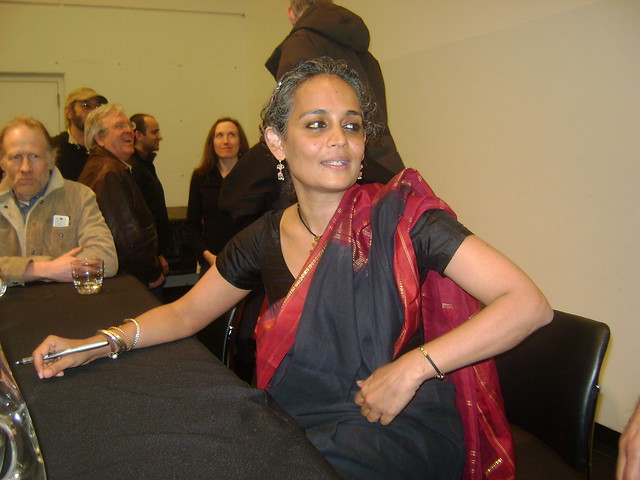By Vanya Mehta, TwoCircles.net,
Since the publication of Arundhati Roy’s introduction to The Annihilation of Caste, called “The Doctor and the Saint,” intellectuals and Dalit activists have spoken out against her as a choice for the introduction as well as her over-emphasis on Mahatma Gandhi’s story over Dr. Bhimrao Ramji Ambedkar’s story.
The article written by Scroll.in’s Shivam Vij argues that Arundhati Roy should be allowed to write about Dr. Ambedkar even though she is upper caste. Mr. Vij also picks on Dalit activist Anoop Kumar for supposedly not having read the text. This is true for many debates, even the pro-RSS radicals who stood outside Caravan Magazine’s office burning copies of the Swami Aseemanand article, probably hadn’t read the text.

Arundhati Roy [TCN file photo]
I begin my criticism by extracting this line: “You would think, therefore, that Dalit intellectuals would only be happy that Arundhati Roy is engaging with the text,” Mr. Vij responds in the Scroll.in post. My qualm is this: an upper-caste Brahmin has no right to expect or demand Dalit intellectuals to behave, respond, or “only be happy” over any particular idea. In fact, we should expect debate, discord, and frustration, because the Dalit cause has been long ignored and subjugated for centuries.
Without getting the chance to actually contact Dalit intellectuals to further investigate their point of opinion, I can see that their quotes to the Hindu are not quite as radical as made out by Mr. Vij. For example, Bojja Takaram does not say that Ms. Roy should not write, or that the book should not be republished. He only says that the preface focuses more on Gandhi than on Ambedkar. When examining the text of “The Doctor and the Saint,” I myself can see quite a heavy emphasis on re-writing the Gandhi narrative, rather than a detailed focus on Ambedkar. Not to mention, at least these so-called “radicals” are not calling that it never be published, unlike the Wendy Doninger-type opponents.
The space in the public discourse for Dalit activists and intellectuals is extremely narrow. As professors and authors for Dalit issues, especially those who have spent years and years researching and pouring through Dr. Ambedkar’s work, there is a certain uncomfortable reaction bound to come out of the surface to see Ms. Roy’s response. Rather than expecting Dalit intellectuals to be “happy,” we should engage and question and give them a space in places like Scroll.in to actually express their viewpoint.
Without this, writing about inner-circle Dalit debates from an upper-caste perspective does their cause a disservice. While we “Brahmins” seek to understand “their” perspective or disagreements, if we don’t give them a space or a column in the media discourse, our words are nothing.

